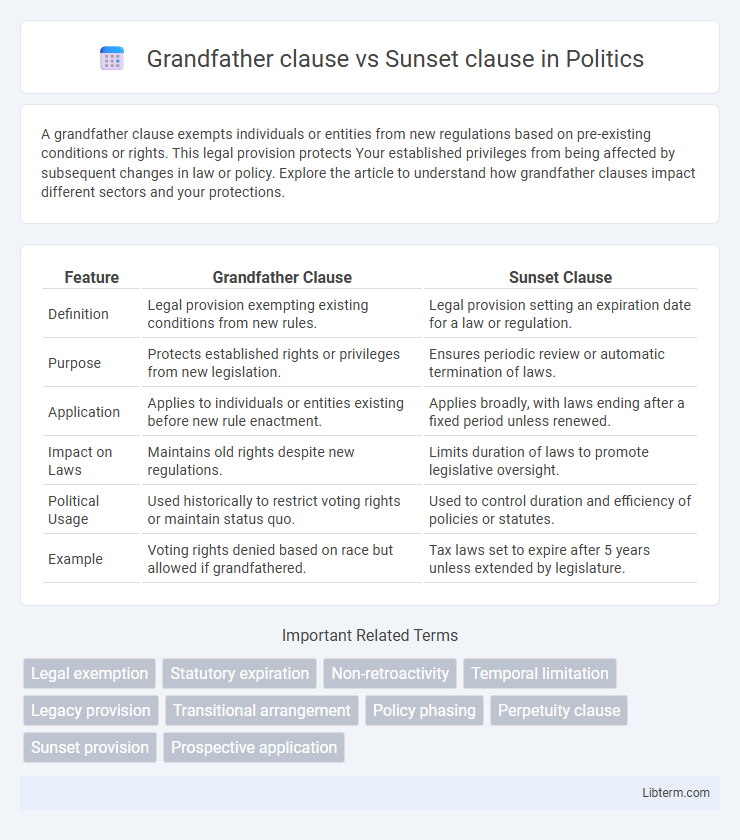A grandfather clause exempts individuals or entities from new regulations based on pre-existing conditions or rights. This legal provision protects Your established privileges from being affected by subsequent changes in law or policy. Explore the article to understand how grandfather clauses impact different sectors and your protections.
Table of Comparison
| Feature | Grandfather Clause | Sunset Clause |
|---|---|---|
| Definition | Legal provision exempting existing conditions from new rules. | Legal provision setting an expiration date for a law or regulation. |
| Purpose | Protects established rights or privileges from new legislation. | Ensures periodic review or automatic termination of laws. |
| Application | Applies to individuals or entities existing before new rule enactment. | Applies broadly, with laws ending after a fixed period unless renewed. |
| Impact on Laws | Maintains old rights despite new regulations. | Limits duration of laws to promote legislative oversight. |
| Political Usage | Used historically to restrict voting rights or maintain status quo. | Used to control duration and efficiency of policies or statutes. |
| Example | Voting rights denied based on race but allowed if grandfathered. | Tax laws set to expire after 5 years unless extended by legislature. |
Introduction to Grandfather Clause and Sunset Clause
The Grandfather Clause allows existing entities or conditions to continue under previous regulations while new rules apply to future cases, preserving established rights or privileges. The Sunset Clause sets a predefined expiration date for a law or regulation, requiring reevaluation before renewal or termination. These provisions are essential for balancing regulatory continuity and timely policy review in legal and legislative frameworks.
Defining the Grandfather Clause
The Grandfather Clause is a legal provision that exempts certain existing conditions or entities from new regulations, allowing them to continue operating under previous rules. It primarily aims to protect rights or benefits that were established before the introduction of new laws or policies. In contrast, the Sunset Clause sets an expiration date for a law or regulation, requiring reevaluation or renewal to remain in effect.
What is a Sunset Clause?
A sunset clause is a legislative provision that sets an expiration date for a law or regulation unless further legislative action is taken to extend it. It ensures that policies are regularly reviewed and prevents outdated or unnecessary laws from remaining in effect indefinitely. Unlike a grandfather clause, which exempts certain individuals or entities from new regulations, a sunset clause mandates the automatic termination of the law after a specified period.
Key Differences Between Grandfather Clause and Sunset Clause
The key difference between a grandfather clause and a sunset clause lies in their application and duration: a grandfather clause exempts existing entities or conditions from new regulations, preserving prior rights or rules, while a sunset clause sets an expiration date for laws or regulations, causing them to automatically terminate unless renewed. Grandfather clauses often protect established rights during legal changes, whereas sunset clauses are designed to limit the lifespan of legislative measures to ensure periodic review. These distinctions impact regulatory compliance, legal continuity, and policy evaluation timelines.
Historical Background and Legal Origins
The grandfather clause originated in late 19th-century Southern United States laws to exempt certain individuals from new voting restrictions, effectively disenfranchising African American voters while protecting white voters' rights. The sunset clause, with roots in regulatory and legislative practices dating back to the 19th century, establishes a preset expiration date for laws or regulations unless renewed, ensuring periodic review and preventing indefinite enforcement. Both clauses reflect strategic legal mechanisms used historically to manage the implementation and longevity of laws within the U.S. legal system.
Applications in Law and Policy
Grandfather clauses in law and policy allow existing entities or rights to continue under previous regulations, avoiding disruption when new rules are implemented, commonly seen in zoning laws and licensing. Sunset clauses mandate the automatic expiration of statutes or regulations after a set period unless renewed, often used to ensure periodic legislative review and prevent outdated laws. Both clauses serve as tools for balancing regulatory stability and adaptability, with grandfather clauses preserving vested rights and sunset clauses promoting legislative accountability.
Advantages of Grandfather Clauses
Grandfather clauses provide legal stability by allowing existing entities or rights to continue unaffected when new regulations or laws are implemented, minimizing disruption and economic loss. These clauses protect investments and promote fairness by preventing retroactive application of new rules to previously compliant actions, fostering trust and predictability in regulatory environments. By ensuring continuity, grandfather clauses reduce administrative burdens and litigation risks associated with sudden changes in policy or compliance requirements.
Benefits of Sunset Clauses
Sunset clauses provide a defined expiration date for laws or regulations, promoting periodic review and preventing outdated or unnecessary rules from persisting indefinitely. This mechanism encourages legislative adaptability and accountability, ensuring that policies remain relevant to current conditions. Unlike grandfather clauses, which permanently exempt existing entities from new regulations, sunset clauses foster continuous evaluation and potential reform.
Common Examples in Real-World Scenarios
A Grandfather clause exempts existing conditions or entities from new regulations, such as allowing existing businesses to operate without meeting updated zoning laws. A Sunset clause sets an expiration date on laws or regulations, forcing periodic review or automatic repeal, commonly seen in tax incentives that expire after a set period. Both clauses are widely used in legislative frameworks to balance continuity with regulatory updates.
Choosing Between Grandfather and Sunset Clauses
Choosing between grandfather and sunset clauses depends on the regulatory goals and the desired impact timeline. Grandfather clauses protect existing conditions or rights, allowing current entities to continue under old rules while preventing new entrants from changing the landscape, preserving stability. Sunset clauses impose automatic expiration dates on laws or regulations, ensuring periodic review and adaptability to evolving circumstances, which promotes flexibility in policy enforcement.
Grandfather clause Infographic

 libterm.com
libterm.com